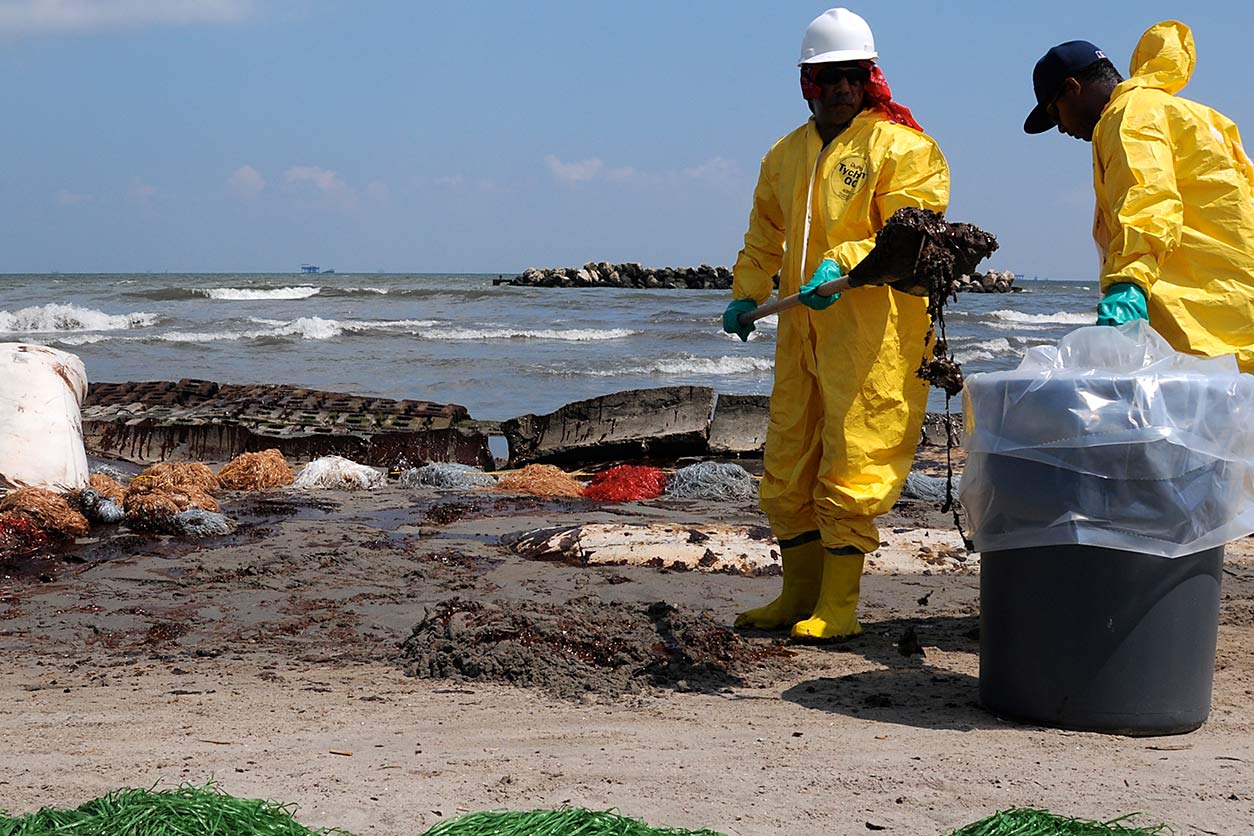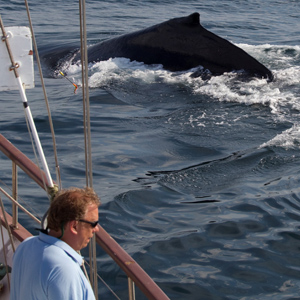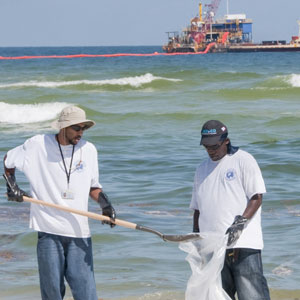In the decade following the Deepwater Horizon oil spill, the NIEHS Gulf Long-term Follow-up (GuLF) STUDY has tracked numerous health issues reported by cleanup workers. These issues include skin rashes, wheezing and difficulty breathing, headaches, nausea, depression and anxiety, and heart attacks. However, the most recent publication to emerge from the research suggests that some health effects associated with the spill may resolve over time.
 “This is not an easy cohort to follow,” said Sandler, referring to participants in the GuLF STUDY. “Some are using disposable cell phones, and they're in and out of the workforce.” (Photo courtesy of Steve McCaw)
“This is not an easy cohort to follow,” said Sandler, referring to participants in the GuLF STUDY. “Some are using disposable cell phones, and they're in and out of the workforce.” (Photo courtesy of Steve McCaw)The study was published online April 5 in the Journal of Toxicology and Environmental Health. Researchers reported that the decreased lung function previously observed in people involved in oil spill cleanup returned to normal within four to six years of the spill.
“This is probably the most important paper from this study, to date,” said Dale Sandler, Ph.D., head of the NIEHS Epidemiology Branch, which oversees the GuLF STUDY.
Largest of its kind
On April 20, 2010, the Deepwater Horizon drilling rig exploded and sank in the Gulf of Mexico, resulting in the largest marine oil spill in U.S. history. Tens of thousands of people who helped with the cleanup faced exposures from crude oil, burning oil, dispersants, and other pollutants.
NIEHS launched the GuLF STUDY shortly afterwards to examine health effects associated with these exposures. Ten years later, it has nearly 33,000 participants and more than 30 publications.
 The spill exposed cleanup workers, such as these in Port Fourchon, Louisiana, to two unique exposures: dispersant spraying and oil slick burning. (Photo courtesy of U.S. Coast Guard)
The spill exposed cleanup workers, such as these in Port Fourchon, Louisiana, to two unique exposures: dispersant spraying and oil slick burning. (Photo courtesy of U.S. Coast Guard)Lung effects
For this latest study, researchers asked whether health effects detected shortly after the spill persisted years later. Participants performed lung function tests using a spirometer, which is a device commonly used to evaluate lung function in relation to other exposures, such as smoking and air pollution. They measured lung function using the spirometer one to three years after the spill and then again four to six years after the spill.
Initially, researchers observed significant decreases in lung function associated with some oil spill cleanup exposures. However, researchers now report that these decreases in lung function disappeared four to six years after the spill. Interestingly, the greatest improvements occurred in workers with the greatest exposure, such as those involved in burning oil slicks.
 Lawrence is following up on the most recent findings by looking at how environmental factors beyond those related to the oil spill contribute to participants’ lung function. (Photo courtesy of Steve McCaw)
Lawrence is following up on the most recent findings by looking at how environmental factors beyond those related to the oil spill contribute to participants’ lung function. (Photo courtesy of Steve McCaw)The findings provide hope that lung function in even the most affected workers could improve, said NIEHS postdoctoral fellow Kaitlyn Lawrence, Ph.D. But she cautioned that other health effects might not be similarly short-lived.
“There is evidence that you can improve lung function by quitting smoking, so it is reasonable to assume the same thing could happen by removing yourself from a polluted environment,” she said. “However, that might not be the case for effects like cardiovascular disease, mental health, and cancer.”
“For some outcomes such as cancer, it may be too soon to see effects that might only become apparent years later,” added Sandler.
More than chemicals
Sandler’s team continues to find new ways to understand the long-term impact of Deepwater Horizon. For example, they are exploring how various measures of social disadvantage at the individual and community level, like unemployment and other stressors, can affect the mental and physical health of study participants.
“The number one thing that I have learned is that it's not just the chemicals,” said Sandler. “It’s the whole experience of these vulnerable communities, the totality of exposures among those who are so often in harm’s way.”
Sandler thinks that the lessons from the GuLF STUDY about the aftermath of an environmental disaster could be applied to potential impacts of the COVID-19 pandemic. She says people should not simply focus on immediate effects like death tolls and overloaded hospitals.
“I believe it’s not enough to worry about who got the virus and who didn't,” said Sandler. “We need to think about the people whose economic situations have changed, who are dealing with being stuck at home. They're not exercising, they're dealing with daily stress and fear, and all of that has the potential to change their outlook and their disease risks going forward.”
Citation: Lawrence KG, Keil AP, Garantziotis S, Umbach DM, Stewart PA, Stenzel MR, McGrath JA, Jackson WB, Kwok RK, Curry MD, Engel LS, Sandler DP. 2020. Lung function in oil spill responders 4-6 years after the Deepwater Horizon disaster. J Toxicol Environ Health A 83(6):233–248.
(Marla Broadfoot, Ph.D., is a contract writer for the NIEHS Office of Communications and Public Liaison.)









